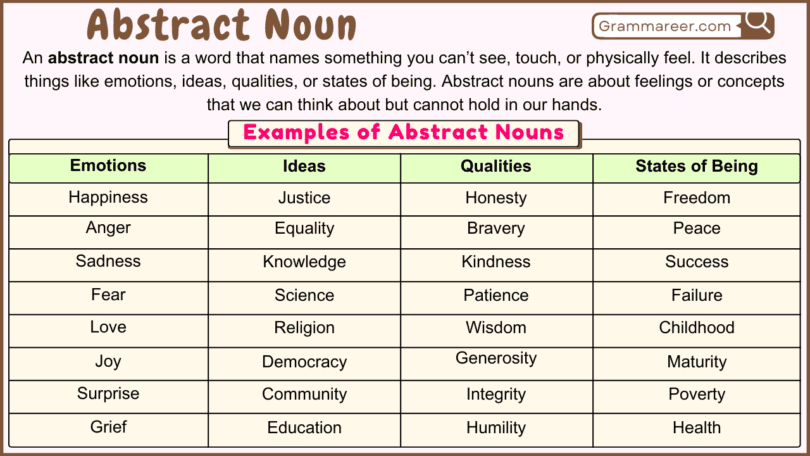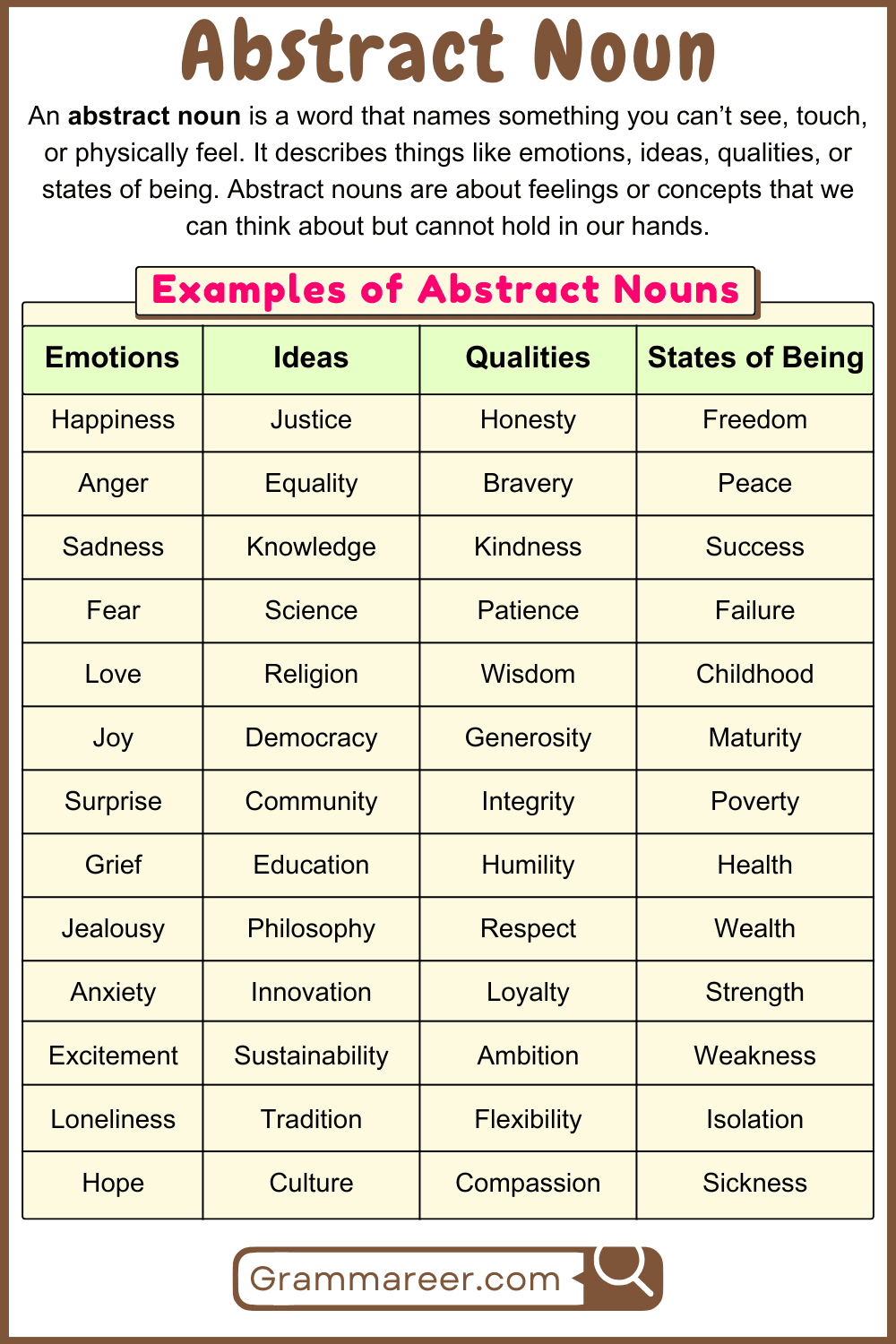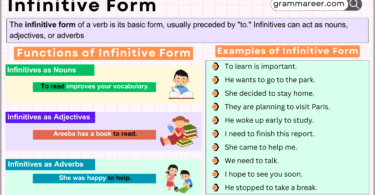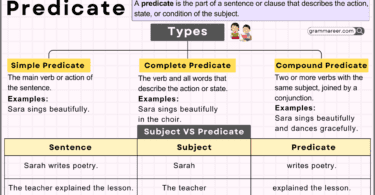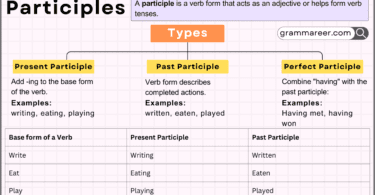Understanding abstract noun can greatly improve both your vocabulary and your ability to express complex ideas in English. They are different from concrete nouns because they refer to ideas, feelings, qualities, or concepts that cannot be touched or seen directly.
Table of Contents
What Is an Abstract Noun?
An abstract noun is a word that names something you can’t see, touch, or physically feel. It describes things like emotions, ideas, qualities, or states of being. Abstract nouns are about feelings or concepts that we can think about but cannot hold in our hands. Common abstract nouns include feelings like happiness or sadness, qualities such as honesty or bravery, and states like freedom or knowledge. These nouns help communicate complex ideas in our everyday conversations.
Examples of Abstract Noun
To better understand, here are some examples of abstract nouns in different categories:
Emotions: These are feelings that humans experience but cannot physically touch. For example:
-
- Happiness
- Anger
- Sadness
- Fear
- Love
- Joy
- Surprise
- Grief
- Jealousy
- Anxiety
- Excitement
- Disappointment
- Loneliness
- Hope
- Trust
- Courage
- Contentment
- Nostalgia
- Frustration
- Relief
Qualities: These describe characteristics or traits. For example:
-
- Honesty
- Bravery
- Kindness
- Patience
- Wisdom
- Generosity
- Integrity
- Humility
- Respect
- Loyalty
- Ambition
- Creativity
- Flexibility
- Compassion
- Reliability
- Enthusiasm
- Optimism
- Tolerance
- Diligence
- Sincerity
States of Being: Abstract noun also include conditions or states. For example:
-
- Freedom
- Peace
- Success
- Failure
- Childhood
- Maturity
- Happiness
- Poverty
- Health
- Wealth
- Strength
- Weakness
- Loneliness
- Isolation
- Sickness
- Safety
- Anguish
- Existence
- Consciousness
- Belonging
Ideas: These represent thoughts, philosophies, and concepts. For example:
-
- Justice
- Equality
- Knowledge
- Science
- Religion
- Democracy
- Freedom
- Community
- Education
- Philosophy
- Innovation
- Sustainability
- Patriotism
- Tradition
- Culture
- Truth
- Ethics
- Art
- Morality
- Aesthetics
How to Use Abstract Nouns in Sentences
Using abstract nouns in sentences can enrich communication, making it more expressive. Here are some examples:
- Happiness makes me smile.
- I feel sadness when I miss my friends.
- Her kindness helps others.
- Love is important in life.
- He showed bravery when he helped.
- I want freedom to play outside.
- Fear can stop us from trying new things.
- Honesty is the best policy.
- Success comes from hard work.
- Peace is what we all need.
Converting Verbs to Abstract Nouns
Turning verbs into abstract nouns creates words that describe ideas, qualities, or states rather than actions. This helps us talk about concepts like love, happiness, or growth. Here’s how it works in simple steps:
Add Common Suffixes
Adding suffixes like -tion, -ment, -ance, or -ence is a common way to form abstract nouns from verbs. Here are some examples:
| Verb | Abstract Noun |
|---|---|
| Educate | Education |
| Develop | Development |
| Perform | Performance |
| Announce | Announcement |
| Assist | Assistance |
| Exist | Existence |
| Agree | Agreement |
| Appear | Appearance |
| Inspire | Inspiration |
| Move | Movement |
Change the Verb Form
Some verbs become abstract nouns by changing into a slightly different form. Here are examples of verbs that follow this pattern:
| Verb | Abstract Noun |
|---|---|
| Decide | Decision |
| Act | Action |
| Know | Knowledge |
| Grow | Growth |
| Feel | Feeling |
| Live | Life |
| See | Sight |
| Lose | Loss |
| Judge | Judgment |
| Choose | Choice |
Converting Adjectives to Abstract Nouns
In English, converting adjectives to abstract nouns helps us discuss qualities as independent ideas. For example, instead of describing someone as “kind,” we can talk about “kindness” as a general concept. This shift is simple and can enhance how we express thoughts about different qualities. Here’s how it’s done:
- Adding “-ness” to an adjective is one common way to create an abstract noun.
- Using “-ity” is another method, especially for adjectives like “active,” which becomes “activity.”
- Changing endings to “-ence” or “-ance” works for words like “patient” or “important.”
- For some adjectives, the form changes entirely, such as “wise” to “wisdom.”
Differences Between Abstract and Concrete Noun
Here’s a quick look at the key differences between abstract and concrete nouns:
| Aspect | Abstract Noun | Concrete Noun |
|---|---|---|
| Definition | Represent ideas, qualities, or states; intangible concepts | Represent physical objects that can be seen or touched |
| Examples | Happiness, freedom, bravery, knowledge | Table, apple, dog, book |
| Perception | Cannot be seen, touched, heard, tasted, or smelled | Can be perceived through the senses |
| Use in Sentences | Describes feelings, qualities, or ideas | Refers to physical objects or entities |
| Role in Communication | Expresses abstract concepts and emotions | Describes tangible items or people |
Read More

